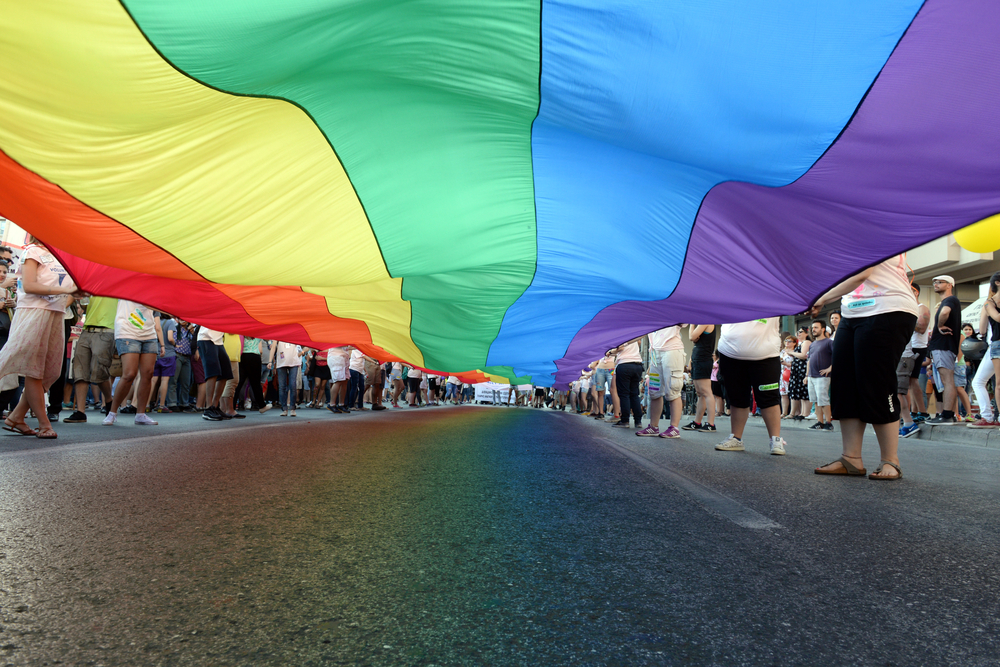
Greece has made history by becoming the first Orthodox-majority country to legalise same-sex marriage. A step that comes after a long journey, marked by strong opposition from the Church and conservative forces in the country
22/02/2024 - Mary Drosopoulos Thessaloniki
The Greek Parliament was a full house on the evening of Thursday 15 February 2024. Ahead of the vote, PM Mitsotakis had delivered an emotional speech: “People who have been invisible will finally be made visible around us. And with them, many children (will) finally find their rightful place. For every democratic citizen, today is a day of joy”.
Upon the passage of the law, the audience attending the hearing, including many well-known artists and human rights activists of the LGBTQI+ community, erupted in loud applause and enthusiastic cheering. Greece had just written history as the first Orthodox-majority country to legalise same-sex marriage.
Outside the parliament, two very distinct groups were communicating diverging social messages. On the one hand, conservative protesters opposing the bill had taken to the streets brandishing Christian icons, crucifixes and bibles, chanting: ‘Voice of people, wrath of God’. On the other hand, an enthusiastic crowd of LGBT+ supporters waving rainbow flags and Pride banners started a spontaneous street celebration all over Syntagma square singing, dancing and hugging in tears of relief.
A few hours later, the first-ever same-sex wedding announcement in Greece was featured on the Greek newspaper Ta Nea. Stavros Gavriliadis and Dimitris Elefsiniotis, life-long partners and parents of three, had been publicly advocating for marriage equality for years. The couple was in Parliament during the voting.
The law in figures
The bill was voted by a cross-party majority of 176 Mps out of 300, while 76 opposed it. Two abstained from the vote and 46 were not present. This historic development makes Greece the 16th country in the EU and the 35th worldwide to legislate same-sex marriage.
This is the outcome of almost a decade of reforms aiming at gradually aligning the country with EU standards regarding marriage equality. The first important step was made in 2015, when civil partnership agreements for same-sex couples were introduced.
This law was extended in 2016, but no provisions over adoption were foreseen, with legal guardianship being granted only to the biological parent. In the same year, Greece prohibited discrimination on the grounds of sexual orientation in employment and in the provision of goods and services.
Two years later, in 2017, Greek lawmakers passed legislation allowing people to have their gender identity legally recognised, paving the way for the launching of ‘training sessions on gender and sexuality for civil servants’, introduced in 2022, and the appointment of a committee responsible for drafting a national strategy to improve LGBT+ rights.
Only a couple of years ago, in 2022, did Greece join Malta, Germany and France in banning ‘Conversion therapy ’ for minors; a controversial practice designed ‘to suppress sexual orientation or gender identity’ through a number of ‘treatments’.
Despite the EU’s repeated calls on its Member States to ban such ‘degrading and discriminatory’ practices, warning of ‘permanent physical and psychological harm’, conversion therapies still exist all over the Union.
The law foresees child adoption but not surrogate parenthood
The Greek public opinion had been divided ever since January 24, when the draft bill was published and made available for public consultation.
Opponents responded with fierce criticism, accusing the government of jeopardising fundamental Greek-Orthodox values. Projecting the ideological triangle of ‘Homeland, Religion, Family’ – a slogan intertwined with Greek ultra-orthodox conservatism, the inception of which dates back to the ‘Moral reform’ of the late 19th century – political figures representing mainly right-wing ideology expressed their ardent opposition on TV channels, op-eds and the social media, focusing especially on the bill’s provision allowing child adoption by same-sex couples.
The model of the ‘traditional Greek family, consisting of a father and a mother’ was the main argument brought forward by the Greek Orthodox church. The circular of the Holy Synod, read by priests all over the country during the Sunday liturgy that followed the publication of the bill, stated clearly that the Church strongly opposes same-sex marriage.
Commenting specifically on the adoption of children by same-sex couples, identified within the bill as ‘parent 1’ and ‘parent 2’, the Synod raged: "This condemns future children to growing up without a father or mother in an environment of parental role confusion", warning that such a development would ‘threaten the sacred institution of marriage’.
LGBTQI+ couples’ right to adoption has been one of the most controversial aspects of the new law. Interviewed by OBCT, developmental psychologist Irini Makridou gives a different interpretation of this debate:
“The issue should not be who will raise a child, but how. It is not about the person, but rather the context. There are children who grow up in so-called ‘traditional’ families, but under unacceptable conditions, by abusive or negligent mothers and fathers”.
Makridou explains that children raised in a same-sex family by parents who have worked on their parenting skills can receive the affection and care that they need to feel complete and happy in life. Moreover, she expresses her scepticism regarding one of the most ambiguous topics dominating the national media:
“There is no scientific evidence supporting allegations that a child raised in a same-sex household is more prone to becoming homosexual than a child who grows up with heterosexual parents. Living and working in a peripheral area, inside a relatively more conservative society compared to big urban centres, I can say that the Greek society is not ready yet to accept and embrace these pivotal developments. Social change should start from the formal schooling system. Diversity, however, is still a taboo in Greek schools”.
PHOTO Gay pride in Athens - © Kostas Koutsaftikis/Shutterstock
No comments:
Post a Comment